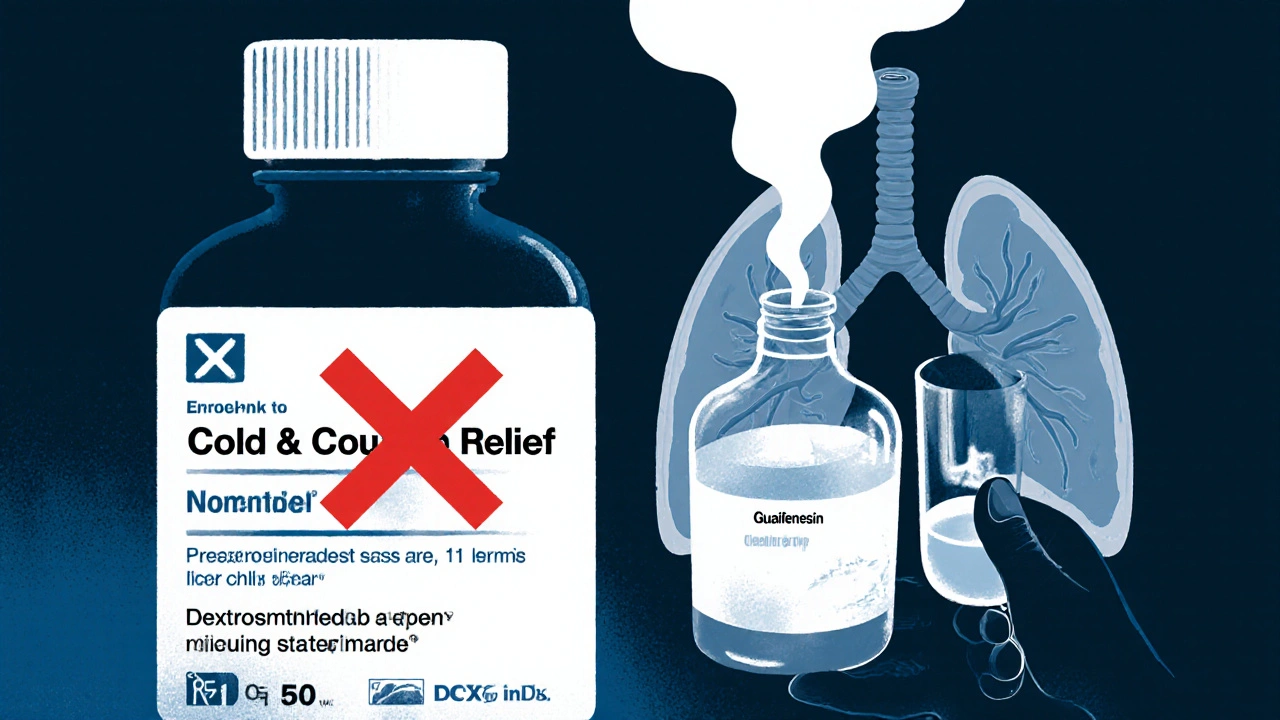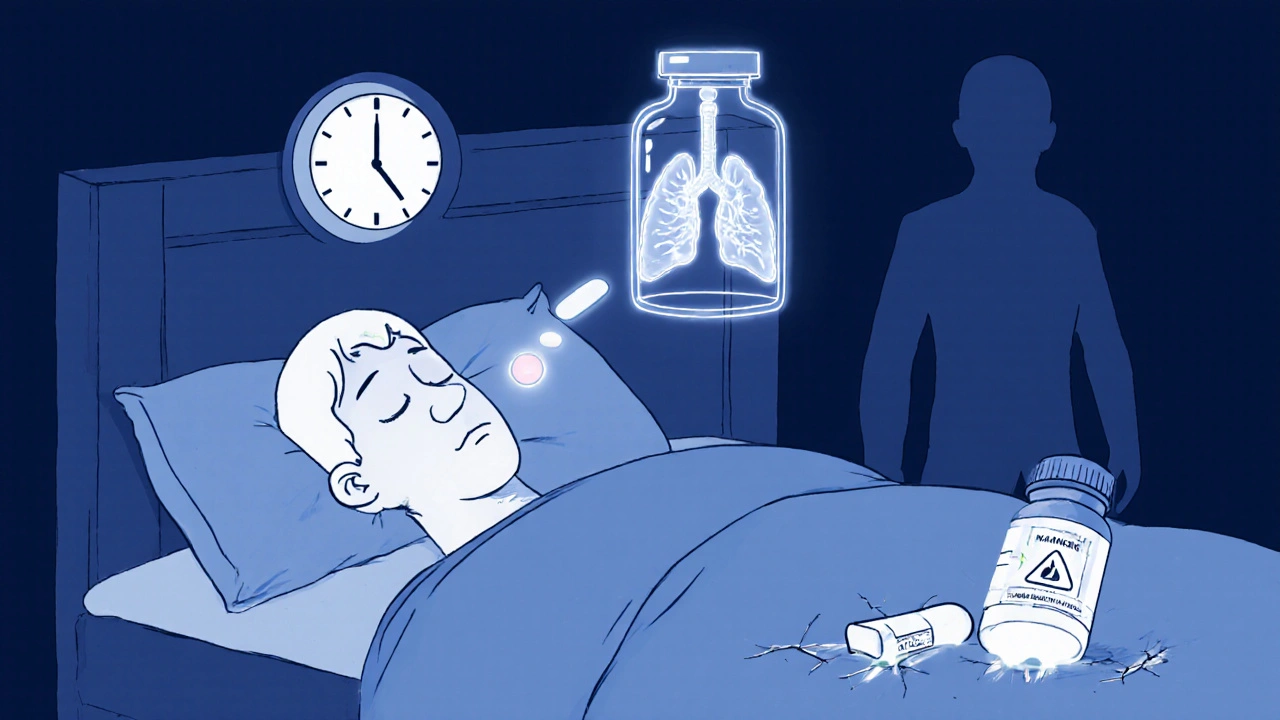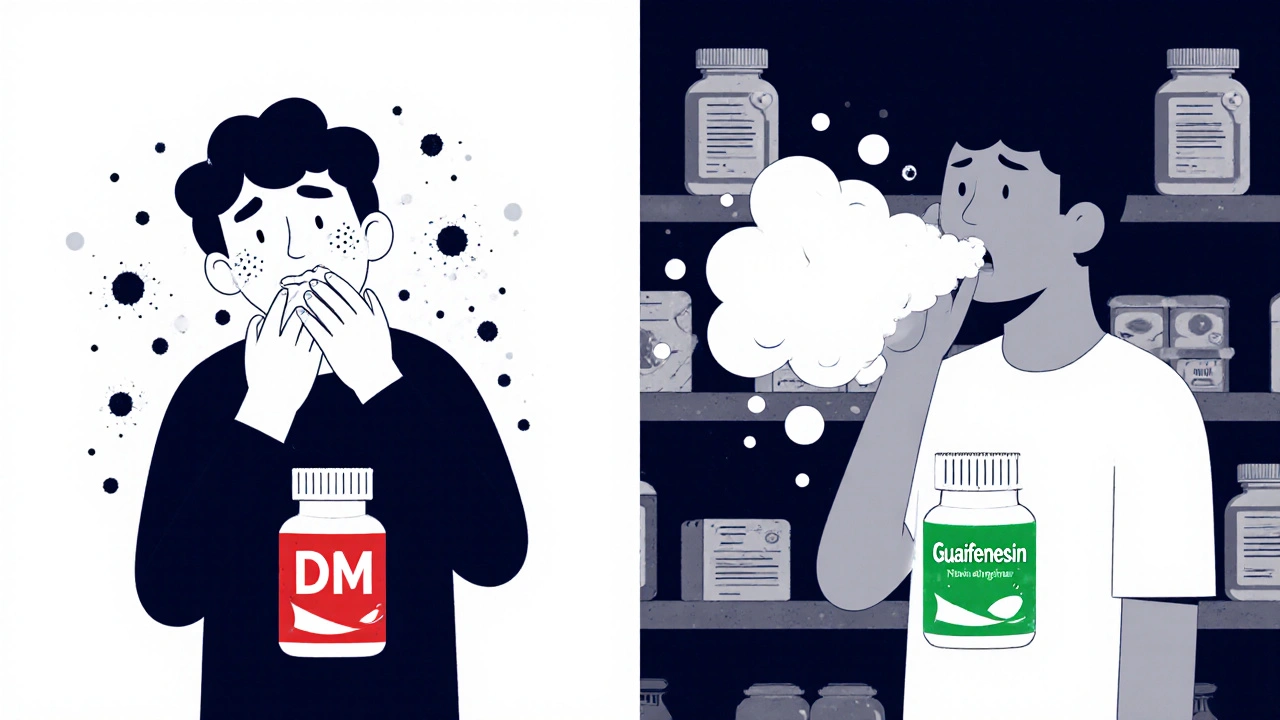Not All Coughs Are the Same - And Neither Are the Medicines
You wake up coughing. It’s dry, scratchy, keeps you up at night. You grab the nearest bottle from the medicine cabinet - probably something labeled "cough relief." But what if that bottle is making things worse? The truth is, not every cough needs the same fix. In fact, using the wrong kind of OTC cough medicine can delay recovery, trap mucus in your lungs, or even cause side effects you didn’t expect.
There are two main types of OTC cough medicines: cough suppressants and expectorants. They work in opposite ways. One stops the cough. The other helps you cough up what’s bothering you. Picking the right one isn’t about brand names or price tags - it’s about what your body is doing.
What Does Your Cough Sound Like?
Start here: listen to your cough. Is it dry and tickly, like you’ve got dust in your throat? No mucus comes out, even when you try. That’s a non-productive cough. It’s often caused by irritation - maybe from a virus, post-nasal drip, or dry air. This is where cough suppressants come in.
Now, if your cough is deep, rattling, and you’re bringing up thick mucus - yellow, white, or clear - that’s a productive cough. Your body is trying to clear infection or congestion from your lungs. This is where expectorants help. They don’t kill the cough. They make it more effective.
Here’s the simple test: after you cough, do you spit something out? If yes, you need an expectorant. If nothing comes out and the cough just hurts, a suppressant might be better. Most people skip this step and grab whatever’s on sale. That’s why 40% of OTC cough medicine purchases are mismatched to the actual cough type, according to the National Community Pharmacists Association.
Cough Suppressants: When to Use Them (and When Not To)
The most common cough suppressant you’ll find on shelves is dextromethorphan (often listed as DM or DXM). It’s in brands like Delsym, Robitussin Maximum Strength, and many store brands. It doesn’t make you sleepy like older cough medicines (think codeine), but it does quiet the cough reflex in your brain.
It works best for dry, hacking coughs that interfere with sleep or daily life. Studies show it can reduce cough frequency by 60-70% in these cases. But here’s the catch: if you’re coughing up mucus, suppressants are a bad idea. They block the cough reflex - which means your lungs can’t clear out the gunk. That can lead to worse congestion, longer illness, or even pneumonia.
Doctors warn against using suppressants for coughs caused by bronchitis, especially if you’re producing colored mucus. The American College of Chest Physicians gives this a strong recommendation: don’t use suppressants for productive coughs. It’s like putting a bandage over a leaky pipe instead of fixing the pipe.
Also, dextromethorphan can be misused at high doses. Some teens and young adults take large amounts for hallucinogenic effects - a dangerous trend. Stick to the label: 15-30 mg every 4-8 hours. Don’t double up because you think "more is better."
Expectorants: How They Help You Cough Better
There’s only one FDA-approved expectorant ingredient in OTC products: guaifenesin. You’ll see it in Mucinex, Robitussin Chest Congestion, and generic versions. Unlike suppressants, guaifenesin doesn’t stop coughing. It makes your mucus thinner and easier to clear.
How? It increases fluid production in your airways. Think of it like adding water to honey - suddenly, it flows better. Clinical studies show it increases respiratory fluid volume by about 26% within 30 minutes of taking it. That’s why people say, "I finally felt like I could breathe."
But here’s the secret most people miss: guaifenesin needs water. Without enough fluids, it doesn’t work well. The average person needs at least 64 ounces (about 2 liters) of water a day when taking it. Most users drink less than half that - which is why 57% of people report it "not working." It’s not the medicine. It’s the lack of hydration.
Take it with a full glass of water. Keep sipping throughout the day. If you’re taking the extended-release tablets (like Mucinex), don’t crush or chew them - swallow whole. And don’t expect instant results. It can take 12-24 hours to notice a difference. That’s normal.

Combination Products: The Hidden Trap
Look closely at the label. Many bottles say "Cold & Cough Relief" or "Nighttime Cough & Congestion." These often contain both dextromethorphan and guaifenesin - plus antihistamines, decongestants, or pain relievers. Sounds convenient, right?
Wrong.
Here’s why: if you have a wet cough, you don’t need a suppressant. Taking both ingredients means you’re blocking your body’s natural cleanup system while trying to thin mucus. It’s contradictory. A 2022 Kaiser Permanente survey found that 43% of people used these combo products for productive coughs - and felt worse as a result.
Even worse, you might be taking extra acetaminophen or pseudoephedrine without realizing it. That raises your risk of overdose. The FDA issued a safety warning in 2021 specifically about giving these combo products to kids under 6. But adults make the same mistake.
Stick to single-ingredient products. If you have a dry cough, get dextromethorphan only. If you’re congested and phlegmy, get guaifenesin only. You can always add a separate nasal spray or pain reliever if needed - but don’t mix cough treatments unless you know exactly what you’re doing.
Real People, Real Mistakes
Reddit user u/ColdSufferer2023 posted: "I used Robitussin DM for my phlegmy cough for 3 days before realizing I should’ve used the chest congestion version. No wonder I felt worse."
That story isn’t rare. Amazon, CVS, and Walgreens reviews show a pattern. People who bought Mucinex (guaifenesin) and followed hydration advice gave it 4.1 out of 5 stars. Many said, "I slept through the night for the first time in a week."
Meanwhile, dextromethorphan products like Delsym got 3.8 out of 5. Users liked how it stopped the cough - but 27% complained about drowsiness, and some said their cough came back worse after a few days.
Pharmacists in Cape Town, New York, and Chicago all report the same thing: people don’t know the difference. They see "cough medicine" and assume it’s one-size-fits-all. It’s not.
What to Look for on the Label
Don’t just grab the biggest bottle. Read the Active Ingredients section. Here’s what to scan for:
- If it says dextromethorphan or DM - it’s a suppressant. Use only for dry coughs.
- If it says guaifenesin - it’s an expectorant. Use only for wet, phlegmy coughs.
- If it says "DM + Guaifenesin" or "Cough & Chest Congestion" - avoid unless you’re sure you need both (you usually don’t).
- Check the dosage: immediate-release guaifenesin is 200-400 mg every 4 hours. Extended-release is 600-1200 mg every 12 hours. Don’t exceed the max daily dose.
- Watch for alcohol content. Some syrups have up to 25% alcohol. Avoid if you’re pregnant, on certain medications, or recovering from alcohol use.
Also, check the expiration date. OTC cough medicines lose effectiveness over time. If it’s older than a year, toss it. And never use medicine meant for adults on a child under 4 - the FDA explicitly warns against it.

When to See a Doctor
OTC cough medicines are for short-term relief. If your cough lasts more than 7-10 days, gets worse, or comes with fever, chest pain, shortness of breath, or blood in mucus - see a doctor. These aren’t signs of a simple cold.
Also, if you have asthma, COPD, or other chronic lung conditions, talk to your doctor before using any OTC cough medicine. Suppressants can mask worsening symptoms. Expectorants might help, but only under supervision.
And remember: these medicines treat symptoms, not the cause. If a virus is behind your cough, your body needs time to heal. Medicine just helps you feel better while it happens.
Smart Choices for 2025
The market is changing. More people are choosing single-ingredient products. Mucinex’s new MoistureLock formula, launched in March 2023, combines extended-release guaifenesin with a hydration-boosting agent. Sales are up 9% year-over-year.
Meanwhile, the FDA is working on new labeling rules. By late 2024, all OTC cough products will have pictograms showing whether they’re for "Dry Cough" or "Chest Congestion." That should cut confusion by 35%.
For now, you’re the best judge. Know your cough. Read the label. Drink water. Don’t overdo it. And if you’re unsure - ask your pharmacist. They’ve seen this a hundred times.
Quick Summary
- Dry, tickly cough? Use a cough suppressant with dextromethorphan.
- Wet, phlegmy cough? Use an expectorant with guaifenesin.
- Never use suppressants if you’re coughing up mucus - it can trap infection.
- Expectorants need water. Drink at least 64 oz daily while taking them.
- Avoid combo products unless you’re certain you need both ingredients.
Can I take a cough suppressant and an expectorant together?
Only if your doctor says so. Most people don’t need both. Taking a suppressant with a productive cough blocks your body’s natural way of clearing mucus. If you have a dry cough at night and a wet cough during the day, you might use them at different times - but don’t mix them in one dose. Always check with a pharmacist.
Is guaifenesin safe for kids?
Guaifenesin is approved for children 4 years and older. For kids under 4, the FDA advises against any OTC cough or cold medicine. For children 4-11, use only the child-specific dosage forms and never exceed the label instructions. Always use a proper measuring tool - never a kitchen spoon.
Why does my cough get worse at night?
Lying down lets mucus pool in your throat and airways, triggering coughing. If it’s a wet cough, suppressants at night can make this worse by stopping your body from clearing the mucus. Instead, elevate your head with an extra pillow, stay hydrated, and consider guaifenesin during the day. If you need nighttime relief for a dry cough, a single dose of dextromethorphan before bed is fine - but only if no mucus is being produced.
Do expectorants cure infections?
No. Guaifenesin doesn’t kill viruses or bacteria. It only helps your body clear mucus more easily. If you have a bacterial infection like pneumonia, you’ll still need antibiotics. But by helping you cough up mucus, expectorants can prevent secondary complications and make you feel better faster while your immune system fights the infection.
What if I take too much dextromethorphan?
Taking more than the recommended dose can cause dizziness, nausea, rapid heartbeat, hallucinations, or even loss of coordination. In extreme cases, it can lead to seizures or respiratory depression. Never take more than 120 mg in 24 hours. If you suspect an overdose, call poison control or go to the ER immediately. It’s not a recreational drug - it’s a medicine with serious risks when misused.
Next Steps
Next time you reach for a cough medicine, pause. Look at the label. Ask yourself: is this cough dry or wet? Am I drinking enough water? Is this the right tool for the job?
Most people fix their cough by accident. The smart ones fix it on purpose.

Comments (13)